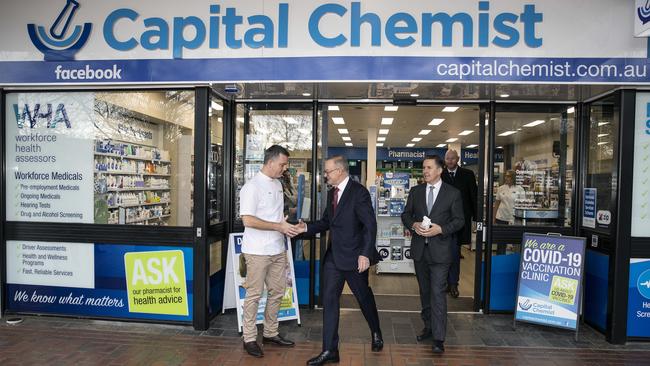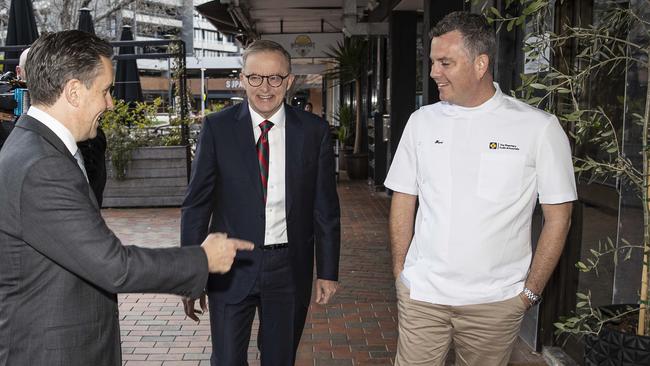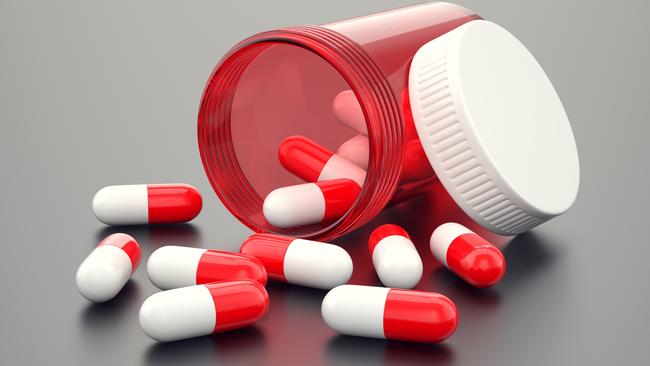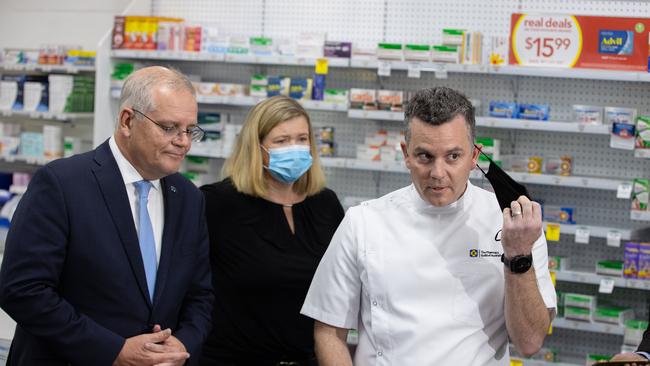Australian pharmacy barons threaten half-price scripts as secret deal forces patients to pay more
Nearly a million Australians can’t afford their medicines but a powerful group representing millionaire pharmacy owners wants to stop a plan to cut prescription prices in half.
Health
Don't miss out on the headlines from Health. Followed categories will be added to My News.
Exclusive: Half price medicines for six million Australians are under threat because outdated rules have turned the pharmacy sector into a near-monopoly run by millionaires and billionaires.
Restrictive government rules which allow only a pharmacist to own a pharmacy and prevent new businesses opening within 1.5 kilometres of an existing shop have sent pharmacy profits surging.
The losers have been ordinary Australians whose medicine bills have skyrocketed with nearly one million people unable to afford to pay for their scripts even though we subsidise medicine in this country.
Pharmacy for sale websites show capital city pharmacies selling for $2-$5 million with one in Adelaide asking $7.5 million, a pharmacy in central Victoria is being sold for $5 million, another in Sydney’s West is asking $6 million.

The Productivity Commission states three quarters of Australia’s pharmacies are essentially controlled by four big groups through franchise and other branding agreements -Wesfarmers, EBOS, Chemist Warehouse and Sigma.
Unlike in the UK, US and New Zealand supermarkets in Australia are banned from selling prescription medicines.
Since 1999 more than 11 government inquiries and expert advisory reports have called for the restrictive rules to end.
In February the Productivity Commission recommended: “Australian governments should follow the lead of the United Kingdom and the United States where pharmacy co-location – for example, pharmacies located in supermarkets — is allowed.”
Health Minister Mark Butler has said “the Pharmacy Guild’s own figures show that the average gross profit of a pharmacy is 34 per cent, which is higher than any other sector of the private medical services industry”.
The Pharmacy Guild which represents the interests of Australia’s pharmacy owners is opposing half price scripts and has a $4 million “fighting fund” to finance its campaign.
However, late on Friday it announced it was suspending this campaign and hoped to negotiate changes to reduce the impact of the policy on pharmacies in a new five year agreement with the government.

“We thank the Prime Minister and the Health Minister for hearing our concerns and 60-day dispensing, along with other reforms, will now be dealt with in the normal way under a Community Pharmacy Agreement,” Pharmacy Guild President Trent Twomey said.
A secret deal negotiated between the government and the powerful Pharmacy Guild means medicine prices rise nearly sixfold when chemists are paid fees of over $17.50 to stick a label on the box.
These fees – worth more than $2.9 billion a year – are at the heart of why chemists are furious about a government policy that would allow patients to get half price scripts – 60 days of medicine supply for the price of 30 days.
When this policy affecting 300 medicines took effect on September 1, chemists started receiving dispensing payments just six times per year instead of 12.
The policy doesn’t apply to all medicines so chemists will still get monthly fees for the bulk of the drugs they sell.
In addition to dispensing fees the taxpayer pays chemists more than $465 million a year for other services such as Webster-paks (packs which organise medicines to be taken by time of day), home medicine reviews, vaccinations and diabetes services and this income won’t be affected.
Plans underway in three states to allow pharmacists to prescribe medications will allow chemists to charge fees of between $20-$55 for this and they can now also earn money from delivering Covid and childhood vaccinations.

The secretly negotiated Community Pharmacy Agreement contains a clause that means if the number of prescriptions Australians buy declines the taxpayer has to compensate them.
In the May 2017 budget chemists were paid $200 million, or around $43,000 per pharmacy because they did not sell as many prescriptions as they hoped. It could have instead funded 10,000 knee replacements or over 9000 hip replacements.
In 2019 Former Health Minister Greg Hunt admitted taxpayers were underwriting pharmacy businesses telling their parliamentary dinner he promised them “certainty” and “bankability over your businesses”.

In New Zealand chemists can discount the patient charge for prescriptions under that country’s medicine subsidy scheme and some chemists provide free medicines.
Not so under our pharmacy agreement where chemists can only discount the $7.30 pensioner co-payment or the $30 general patient co-payment by $1 even though one major pharmacy chain wants to go further.
This monopolistic situation and all of these rules added up to a situation where in 2021-22 the Australian Bureau of Statistics found nearly 800,000 Australians either delayed or went without their prescription medication because they couldn’t afford it.
The Albanese Government stepped in to slash the general patient co-payment from $42.50 to $30 and in the May budget it went further with its half price medicines policy.
The head of the Pharmacy Guild Professor Trent Twomey – who earns a $400,000 a year salary – cried on national television claiming the 60 days script policy will force the closure of 665 pharmacies and lead to the sacking of 20,000 workers.
The government has pledged to return all the $1.2 billion it saves from the measure to pharmacies and says since it announced the policy the number of people applying for a new pharmacy licence doubled.

Many discount pharmacies were already selling medicines at half price and forgoing the $17.59 dispensing fee even before the government mandated the new policy.
Pharmacists are planning a mass protest against the 60-day dispensing policy in Canberra this week and warn they will have to charge for services like blood pressure and stroke checks.
Doctors and consumer groups are pleading for the half price script policy to go ahead but it remains in jeopardy with the Coalition set to move a motion in the Senate to disallow it this week.
“This change will make many medicines half price. It will mean less travelling to get scripts and medicines. It puts patients first. And that is who all healthcare providers, and politicians, should be focused on supporting,” Australian Medical Association president Professor Steve Robson said.
In a statement EBOS said “governments across Australia are currently working with urgency to further expand pharmacists’ ‘scope of practice’ to enable improved access and enhanced health outcomes to be delivered from pharmacy. If this initiative is well executed, then it will have the tangible benefit of easing pressure on the country’s overall health system.”
EBOS has committed to Government that it will continue to invest in supporting and improving the health system.
Originally published as Australian pharmacy barons threaten half-price scripts as secret deal forces patients to pay more





